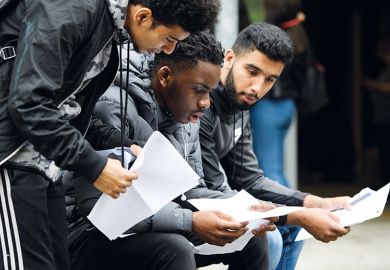Universities have been cautioned against wholeheartedly embracing contextual admissions by the Westminster government’s social mobility watchdog, which warns that the tactic may help a “lucky few” get on in life but has not had a “noticeable impact” on tackling inequality more broadly.
In recent years higher education institutions have been urged – including by the Office for Students, the English regulator – to lower their entry requirements for applicants from under-represented backgrounds to better reflect the educational disadvantages that they have faced compared with their more privileged peers. For example, the University of Warwick, which typically demands grades ranging from A*AA to ABB, admits some local students from deprived backgrounds with grades as low as CCC.
But some have questioned the fairness of contextual admissions and, in a report published on 5 December, the Social Mobility Commission – a non-departmental public body charged with reducing inequality in England – expresses doubts about the approach.
The SMC says that while lowering entry grades “certainly helps a small number of people…it risks social mobility policy becoming a zero-sum game, as we are intervening to help one person at someone else’s expense”.
“We are usually completely unaware of who those missing out might be. It is often assumed that they must be someone ‘advantaged’, with the assumption being that this is fairer, but there do not appear to be any studies which collate this evidence,” the report says.
The report adds that different universities “define socioeconomic disadvantage in different ways, meaning that there are inconsistencies around who is eligible to take part in the contextualisation process”.
Further research is needed to evaluate the effectiveness of contextual admissions and identify the best methods for targeting the most disadvantaged students, compared with the alternative approach of focusing on improving educational performance so that under-represented learners can compete with their more privileged peers on a level playing field.
“We encourage further work on interventions which prioritise improving disadvantaged students’ skills and knowledge, rather than lowering entry standards for them – as the latter approach risks being a zero-sum game,” the report says.
More broadly, the SMC characterises contextual admissions as being part of a “lucky few” approach to social mobility, typified by “finding academically able but disadvantaged young people, and preparing them for entry to elite universities and elite occupations”.
Improving admissions: how to evaluate the whole student
“While such approaches may be helpful to some individuals, they are typically small-scale, and have not had a noticeable impact on social mobility as a whole,” the report says.
Instead, the SMC says that post-16 pathways “need [to] not only open access to professional occupations but [open up] a wider range of opportunities in a wider range of places”.
In particular, it advocates a “more coherent and better-evidenced” approach to social mobility in relation to vocational education and training, including apprenticeships.
The SMC report, Innovation Generation – next steps for social mobility, sets out the organisation’s proposed approach to improving social mobility in the UK.
It strikes a different note to Universities UK’s recent blueprint for the future of the higher education sector which, while acknowledging that more consistency in approaches to contextual admissions is required, says that this tactic “can partly mitigate the impact of pre-higher education inequalities”.
Alun Francis, the SMC’s chair and principal of Blackpool and the Fylde College, said that approaches to social mobility needed to be “much more aligned with the real obstacles to opportunity experienced in this country”.
“Until now there has been too much focus on the academic route of getting young disadvantaged people into top jobs via elite universities,” he said. “But this approach only favours the lucky few. We must realign social mobility policy so that it addresses a broader range of people in a wider range of places.”
Register to continue
Why register?
- Registration is free and only takes a moment
- Once registered, you can read 3 articles a month
- Sign up for our newsletter
Subscribe
Or subscribe for unlimited access to:
- Unlimited access to news, views, insights & reviews
- Digital editions
- Digital access to THE’s university and college rankings analysis
Already registered or a current subscriber?








